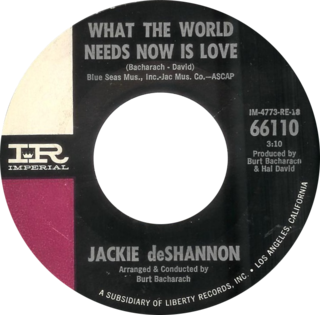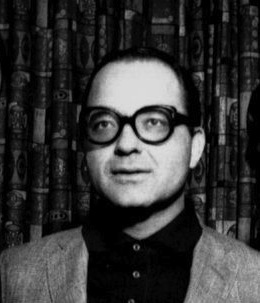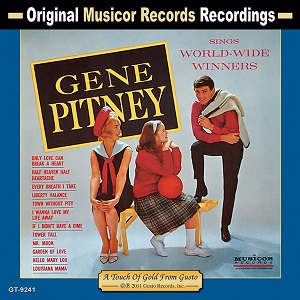Related Research Articles

Gene Francis Alan Pitney was an American singer-songwriter and musician.

The Man Who Shot Liberty Valance is a 1962 American Western film directed by John Ford and starring John Wayne and James Stewart. The screenplay by James Warner Bellah and Willis Goldbeck was adapted from a 1953 short story written by Dorothy M. Johnson. The supporting cast features Vera Miles, Lee Marvin, Edmond O'Brien, Andy Devine, John Carradine, Woody Strode, Strother Martin and Lee Van Cleef.

"Tell Laura I Love Her" is a teenage tragedy song written by Jeff Barry and Ben Raleigh. It was a US top ten popular music hit for singer Ray Peterson in 1960 on RCA Victor Records, reaching No. 7 on the Billboard Hot 100 chart. Later that same year, it was recorded and released by Ricky Valance in the United Kingdom, where it went to the No. 1 spot on the UK Singles Chart. The song has been a hit in 14 countries, and has sold over seven million copies.

"He's a Rebel" is a song written by Gene Pitney that was originally recorded by Vikki Carr and by the girl group the Blossoms. Produced by Phil Spector, the Blossoms' version was issued as a single credited to the Crystals, which topped the Billboard Hot 100 chart in November 1962. It was Spector's second chart-topper after "To Know Him Is to Love Him" (1958).

"What the World Needs Now Is Love" is a 1965 popular song with lyrics by Hal David and music composed by Burt Bacharach. First recorded and made popular by Jackie DeShannon, it was released on April 15, 1965, on the Imperial label after a release on sister label Liberty records the previous month was canceled. It peaked at number seven on the US Hot 100 in July of that year. In Canada, the song reached number one.
"Wives and Lovers" is a 1963 song by Burt Bacharach and Hal David. It has been recorded by numerous male and female vocalists, instrumentalists and ensembles.

"Only Love Can Break a Heart" is a popular song from 1962, performed by the American singer-songwriter Gene Pitney. The song was written by Hal David (words) and Burt Bacharach (music) and appears on Pitney's second album Only Love Can Break a Heart.

Aaron Harold Schroeder was an American songwriter and music publisher.
"Twenty Four Hours from Tulsa" is a song written by Burt Bacharach and Hal David, and was originally a hit in 1963 for Gene Pitney.
"The Windows of the World" is a song written by Burt Bacharach (music) and Hal David (lyrics) which was a hit single for Dionne Warwick in 1967.
"It Hurts to Be in Love" is a song written by Howard Greenfield and Helen Miller which was a Top Ten hit in 1964 for Gene Pitney. It was one in a long line of successful "Brill Building Sound" hits created by composers and arrangers working in New York City's Brill Building at 1619 Broadway.
"Blue on Blue" is a popular song composed by Burt Bacharach with lyrics by Hal David, first recorded and released by Bobby Vinton in April 1963, backed by Burt Bacharach and his Orchestra. Vinton's single spent 13 weeks on the Billboard Hot 100 chart, peaking at No. 3 on July 6, 1963, while reaching No. 2 on Billboard's Middle-Road Singles chart. Vinton's single was a major hit in many other nations as well.

Only Love Can Break a Heart is the second album by songwriter and recording artist Gene Pitney, released on the Musicor label in 1962. It included the top 10 hits "Only Love Can Break a Heart" (#2) and "(The Man Who Shot) Liberty Valance" (#4), which was written for but not ultimately used in, the film of the same name. Three other singles from the album also charted; "Half Heaven-Half Heartache" at #12, "True Love Never Runs Smooth" at #21, and "If I Didn't Have a Dime" at #58.

Gene Pitney Sings World Wide Winners is American singer Gene Pitney's fourth album, released on the Musicor label in 1963. The album mainly comprised material released on Pitney's first two albums, plus two non-album single tracks: "Louisiana Mama" and "Mr. Moon, Mr. Cupid & I", and one previously unreleased track: "Garden of Love".

Gene Pitney's Big Sixteen is American singer Gene Pitney's seventh album, released on the Musicor label in 1964. The album contains a mix of hit singles and album cuts from Pitney's early records.
"Trains and Boats and Planes" is a song written by composer Burt Bacharach and lyricist Hal David. Hit versions were recorded by Bacharach in 1965, by Billy J. Kramer and the Dakotas in the same year, and by Dionne Warwick in 1966.
The Man Who Shot Liberty Valance is a 2014 Western stage play by Jethro Compton based on the 1953 short story of the same name by Dorothy M. Johnson, which also became the basis for the 1962 Paramount Pictures film The Man Who Shot Liberty Valance, directed by John Ford, starring James Stewart and John Wayne, with the song performed by Gene Pitney. The play is billed as "classic story of good versus evil, law versus the gun, one man versus Liberty Valance. A tale of love, hope and revenge set against the vicious backdrop of a lawless society".
"Half Heaven – Half Heartache" is a song released by Gene Pitney in 1962. The song spent 12 weeks on the Billboard Hot 100 chart, peaking at No. 12, while reaching No. 4 on Canada's CHUM Hit Parade, and No. 5 on Billboard's Middle-Road Singles chart.
"This Time" is a song written by Chips Moman, which was first recorded by Thomas Wayne and was released as a single on the Fernwood Records label in March 1958. On March 31, 1958, the song was released on the Mercury Records label, as the B-side of "You're The One That Done It".
"(I Wanna) Love My Life Away" is a song written and sung by Gene Pitney, which he released in 1961. The song was Pitney's first charting single, and spent 8 weeks on the Billboard Hot 100 chart, peaking at No. 39, while reaching No. 23 on Canada's CHUM Hit Parade. In the United Kingdom, the song spent 11 weeks on the Record Retailer chart, reaching No. 26.
References
- ↑ "Gene Pitney - Chart History - The Hot 100". Billboard.com. Retrieved June 13, 2017.
- ↑ "1050 CHUM - CHUM Charts, chart No. 271". CHUM. June 4, 1962. Archived from the original on June 3, 2006. Retrieved June 13, 2017.
- ↑ "Flavour of New Zealand: Lever Hit Parade". July 12, 1962. Retrieved June 13, 2017.
- 1 2 Dominic, Serene (2003). Burt Bacharach, Song by Song: The Ultimate Burt Bacharach Reference for Fans, Serious Record Collectors, and Music Critics , Music Sales Group. p. 75. Retrieved October 13, 2016.
- ↑ Western Writers of America (2010). "The Top 100 Western Songs". American Cowboy. Archived from the original on 19 October 2010.